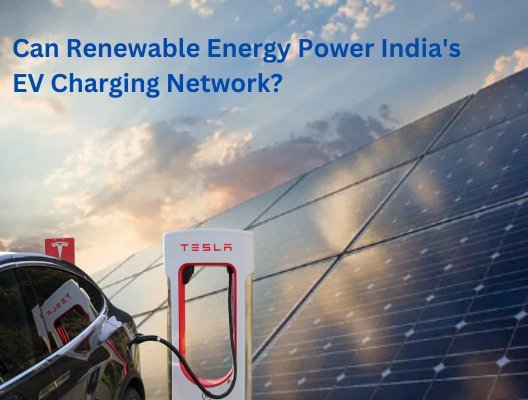Can Renewable Energy Power India's EV Charging Network?
Explore Can Renewable Energy Power India's EV Charging Network?

India’s electric vehicle (EV) revolution is gaining momentum, with an ambitious goal of achieving net-zero emissions by 2070. However, one significant challenge stands in the way: ensuring a sustainable and robust charging infrastructure. Renewable energy, especially solar energy, could play a vital role in powering this network, reducing carbon footprints, and strengthening India's energy independence.
The Current Scenario of EV Charging in India
The growing adoption of EVs has increased the demand for charging stations. According to recent reports, India needs nearly 4 million public charging stations by 2030 to support its EV transition. Unfortunately, most current charging stations rely on electricity from the grid, which is largely powered by fossil fuels.
This dependency contradicts the eco-friendly essence of EVs and highlights the urgent need to integrate renewable energy into the charging ecosystem.
Why Renewable Energy Is the Ideal Solution
Renewable energy sources such as solar, wind, and hydropower are sustainable, clean, and abundant in India. Among these, solar energy emerges as the most promising due to India’s geographic advantage, with over 300 sunny days annually.
Benefits of Using Renewable Energy for EV Charging:
- Reduced Carbon Emissions: EVs powered by renewable energy offer a truly green transportation alternative, cutting down emissions from both vehicles and the grid.
- Energy Independence: Leveraging renewables reduces dependence on imported fossil fuels, enhancing India's energy security.
- Cost-Effectiveness: Renewable energy systems, particularly solar installations, have seen significant cost reductions in recent years, making them a financially viable solution.
- Scalability: Solar energy companies in India are driving the expansion of renewable infrastructure, enabling scalable solutions for EV charging stations.
Solar Energy: The Game-Changer for EV Charging Networks
Solar energy companies are increasingly collaborating with EV stakeholders to establish solar-powered charging stations. These setups involve solar panels mounted on rooftops or nearby areas, generating electricity for EV chargers. Excess energy can be stored in batteries or fed into the grid.
Notable Examples in India:
- Delhi: Several EV charging stations in Delhi NCR are already powered by solar energy, showcasing the feasibility of this approach.
- Karnataka: The state government has partnered with private players to develop solar-powered EV charging hubs, supporting its EV policy.
- Mumbai: A pilot project successfully demonstrated the use of solar energy to power charging stations for two-wheelers and electric cars.
Challenges and the Way Forward
While renewable energy integration is promising, several challenges must be addressed:
- Initial Costs: Setting up solar-powered charging stations involves significant upfront investment. However, government subsidies and incentives are helping offset these costs.
- Space Constraints: Urban areas often lack the space required for large solar panel installations.
- Energy Storage: Effective battery systems are necessary to store solar energy for nighttime or cloudy days.
To overcome these hurdles, the government, private sector, and solar energy companies must work together to innovate and invest in renewable energy solutions for EV charging.
Conclusion: A Sustainable Future
Renewable energy, especially solar power, holds the key to transforming India’s EV charging network into a sustainable, efficient, and green system. By leveraging the expertise of solar energy companies, India can create a model charging infrastructure that aligns with its climate goals and drives the global transition to clean energy.
With the combined efforts of policymakers, businesses, and consumers, India’s EV ecosystem can thrive while setting an example for the world. Renewable energy isn’t just an option—it’s the way forward.
What's Your Reaction?














